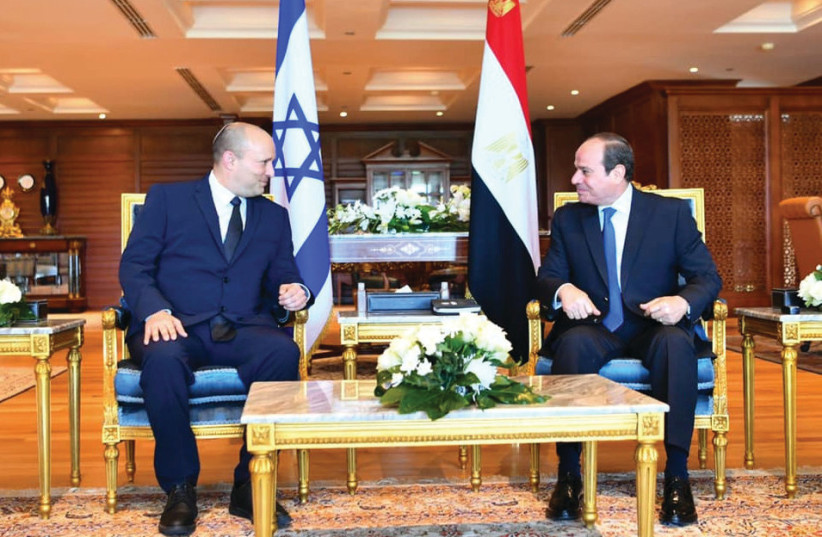Senior Israeli military officers met with their Egyptian counterparts to discuss issues of mutual interest facing both armies and allowing Cairo to deploy more troops to the border with the Gaza Strip, the IDF announced on Monday morning.
The IDF delegation was headed by the head of the Operation’s Division Maj.-Gen. Oded Basiok, the head of the Strategy and Third Circle Division Maj.-Gen. Tal Kalman and the head of the Foreign Relations Division, Brig.-Gen. Efi Dafrin.
During the meeting, which took place on Sunday in the southern Sinai resort of Sharm el-Sheikh, an amendment to the agreement was signed regulating the presence of Egyptian forces in the area of Rafah “in favor of increasing the security presence of the Egyptian army in this area,” the IDF Spokesperson’s Unit said in a statement.
The amendment was approved by the security cabinet, the statement continued, adding that the issue of the missing soldiers and civilians was not discussed.
Rafah is the sole crossing between Egypt and the Gaza Strip and a blockade by the two countries has placed severe restrictions on the movement of goods and people in the enclave for years.

As Cairo is one of the most influential negotiators between Israel and Hamas, the moves regarding the crossing reflect its position regarding Hamas and its behavior. The opening or closure of the crossing usually comes at a time when Cairo is concerned that Hamas could increase tensions and cause a fresh outbreak of hostilities.
Egypt has in the past year closed Rafah crossing several times when there were escalations between terror groups in the coastal enclave and Israel.
The peace treaty signed in 1979 between Egypt and Israel places strict limitations on the number of troops that can be stationed on either side of the Sinai border, but should one country agrees, troops can be increased.
In 2018, Egypt increased its troop presence in the peninsula to 88 battalions with 42,000 soldiers from 41 battalions and 25,000 soldiers that had been deployed to the area in 2017.
Meetings between the two militaries are frequent, and senior Israeli officers including from the IDF’s General Staff have made recent visits to their counterparts in Egypt.
With close ties between the two militaries, Cairo and Jerusalem have been reported by foreign press to have been closely cooperating in the Sinai peninsula in the fight against ISIS militants and smuggling of weapons and drugs across the border.
Last week, Egyptian intelligence chief Abbas Kamel told Axios that Cairo speaks “every day” to both Israel and the Palestinians on several issues including a potential long-term ceasefire in Gaza that would include a prisoner exchange.
The long term ceasefire deal is something that Egypt is “working towards day and night,” the report said, adding that it would see the release of Palestinian prisoners and the return of the bodies of the two IDF soldiers killed in 2014 and two civilians that are being held by Hamas. The deal would also include further economic and humanitarian steps in the enclave.
